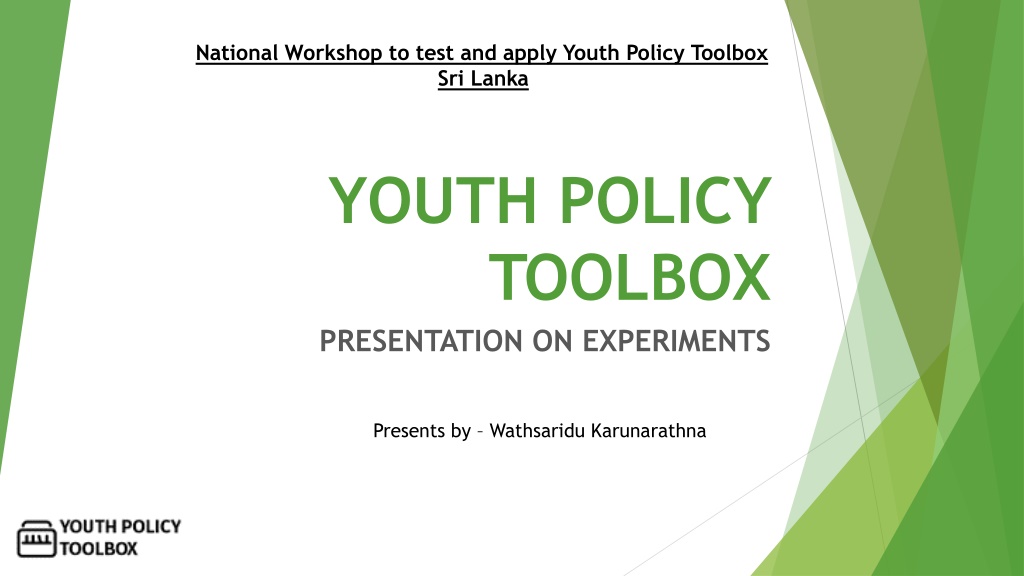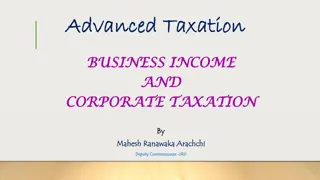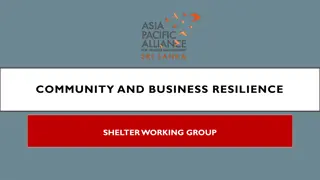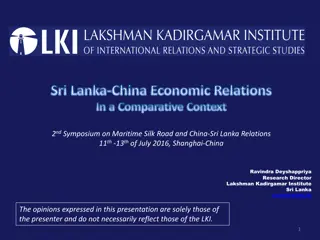Sri Lanka Youth Policy Toolbox: Key Challenges and Experiments
Identified risky assumptions and challenges in Sri Lanka's youth policy-making process, such as lack of coordination and capacity. Implemented experiments targeting youth in cities, government officials, and university students to address these issues through training programs and information sharing.
Download Presentation

Please find below an Image/Link to download the presentation.
The content on the website is provided AS IS for your information and personal use only. It may not be sold, licensed, or shared on other websites without obtaining consent from the author. Download presentation by click this link. If you encounter any issues during the download, it is possible that the publisher has removed the file from their server.
E N D
Presentation Transcript
National Workshop to test and apply Youth Policy Toolbox Sri Lanka YOUTH POLICY TOOLBOX PRESENTATION ON EXPERIMENTS Presents by Wathsaridu Karunarathna
Key Challenges After several discussions with senior government officials, policy makers and youth we identified that risky assumptions for the Policy toolbox in Sri Lankan are, Youth in cities need to add a youth lens to the situational analysis of policy making Policymakers undergo a traditional trajectory of policy making and they have less capacity University students do not want to see good practices from other countries Authorities experience a less coordination between institutions, departments and organizations
Toolbox with online training for policymakers and youth nonprofits and case examples of school-to- work transition programmes from other countries. Keeping the website updated by sharing good practices, information and statistics Youth in cities Respective Policymakers in the Government Sector eg - 1.Ministry of national Policy and Economic affairs 2.Open University of Sri lanka 2.Ministry of Statistics 3. National Youth services council University Students Vulnerable Youth groups Youth in cities would be interested in seeing good practices from other countries in the school- to-work transition space Policymakers can compare the local context with the international context Children can find out opportunities they could pursue after school Reach out to global opportunities Partner with National Youth Services Council to reach out to youth Reach Youth in Cities through Federation of Youth clubs Reach policymakers through the Ministry of Youth University Students through the respective associations/unions National Youth Services Council Ministry of national Policy and Economic affairs Open University of Sri lanka Sri lanka Federation of Youth Clubs Sri lanka Youth Parliament University Students Union
Experiments conducted so far Youth in cities Issue - integrating a youth lens to situation analysis Solution - Consultations with youth on the challenges/ barriers/ weakness they experience in the policy making process EXPERIMENT 1 (EXPLORATION) Government sector officials Issue - Acquiring Capacity that meet the global demands of policy making Solution - Organize an online training program for policy makers EXPERIMENT 2 (PITCH) University students Issue - Decreased flow of information to university students about practices at the global level Solution - Provide information on existing, upcoming opportunities, good practices on school to work transition, then interview about their relevance to them EXPERIMENT 3 (CONCIERGE)
Experiment 1 - Youth in cities Issue - integrating a youth lens to situation analysis Solution - Consultations with youth on the challenges/ barriers/ weakness they experience in the policy making process Test Provide information on Youth policy toolbox statistics and data from the government departments and interview for their perspectives on the current policy making process in sri lanka
The respondents pointed out that lack of career guidance and counselling opportunities in the context No mechanism to measure and ensure decent jobs in the job market Conflict between governments lead to lose their employment with the government change No wide ranging consultation of youth and senior citizens many youth voted on this Over time, developed policies should be corrected or terminated if they turn out to be failures Less knowledge on census, research and employment statistics Having less experienced facilitators and resource people Mismatch between the ideologies when we are going to implement No transparency and credibility in the policy making cause the information is not shared with public
Experiment 2 - Government sector officials Solution - Organize an online training program for policy making Test - Create marketing materials like handouts/sign up forms - Google forms and individually ask whether they believe that they need the international knowledge, experience about policy making?? Then ask are they willing to participate by paying $250 for the program? Ask the same question for $100 and $50 - to measure the level of need** Issue - Acquiring Capacity that meet the global demands of policy making
The respondents pointed out that 100% agreed that Evidence based policies/approaches are productive 50% directly said that they do not have capacity to correlate with international demands and involve in policy making 80% signed up and said that they would like to participate in a training about youth policy and international demands No one pointed out that it is a major issue but an issue to be concerned about. 10% said yes to pay $250 85% said yes to pay $100 5% said not paying either $250,$100 or $50 No higher educational opportunities/ awareness on public policy No methodology to measure the success of the policy making process Need more clear indicators and indices to statistically measure the present situation of unemployment/ underemployment
Experiment 3 University Students Issue - Decreased flow of information to university students about practices at the global level Solution - Provide information on existing, upcoming opportunities, good practices on school to work transition, then interview about their relevance to them Test - Share Good practices with them and Asked them the things that we can adopt? What are the barriers in sri lankan context if we wanted to implement such a good practice?
The respondents pointed out that 80% had stated that case studies could bring better outcomes if implemented in sri lanka (Mongolia Youth labor exchange center/ Nepal Employment fund) Less career guidance opportunities There is a need for a mechanism to ensure decent jobs Communication,access to technology and cultural impact are barriers to find employment No high level identification, endorsement and commitment to gear up Completing professional qualifications that has a demand in the field is essential but competitive Need to register unemployed youth through an online database
Challenges to run experiments Language barrier Access to internet and email is still at a critical state Some partcipants were reluctant to read /reply for emails Changing the traditional policymaking process is not an intention Respondants were busy with their daily routines
Conclusion 1. Giving a youth lens to situational analysis of policy making is highlighted 2. There is a need of policymakers to undergo a capacity building in order to face the challenges in the real world policy making process 3. University students whom are entering into the world of work are interested to know case studies and good practices 4. Mainstreaming Youth in the policy making process is a must























